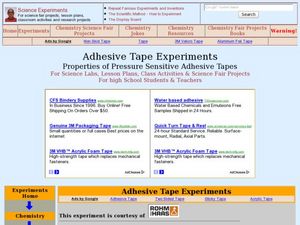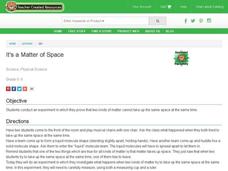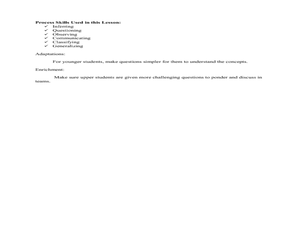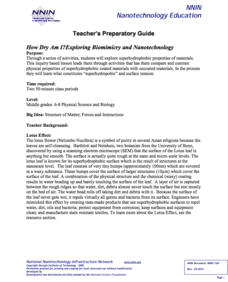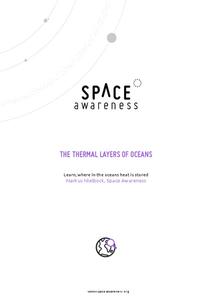Curated OER
The Greenhouse Effect in a Jar
Learners explore climate change by participating in a physical science experiment. In this greenhouse effect lesson plan, students discuss the impact global warming has on our environment and how it works. Learners utilize a glass jar,...
Curated OER
Science and the Scientific Process
Learners investigate the characteristics of different soil samples. In this physical science lesson, students play the role of forensics solving a crime by matching soil from the suspect's shoes. They formulate a conclusion after testing...
Curated OER
"Stick to It!" Properties of Pressure Sensitive Adhesive Tapes
Students investigate the strength of different adhesives. In this physical science lesson, students compare the force needed to peel adhesive tapes from a surface. They analyze collected data and make a generalization.
Curated OER
It's a Matter of Space
Students explore matter. In this physical science lesson, students role play the 3 states of matter forming "liquid" molecules and "solid" molecules with teammates. Students perform an experiment in which the result illustrates that two...
Curated OER
States of Matter and Chemical/Physical Changes Stations
Students break into four groups, starting at different stations. Each station should take about 10 minutes depending on prior knowledge of the topic. They then rotate when everyone is finished to the next station and discuss answers of...
Curated OER
Heat Energy
Students study how matter changes from solids to liquids or liquids to solids. In this physical science lesson, students discuss heat energy and experiment with heat by changing a candle into a liquid using a hot plate.
Curated OER
What Makes Thing Fly?
Second graders study lift, drag and thrust from a real flight instructor. In this physical science lesson students build and fly paper airplanes and experiment with variations and design.
Curated OER
Temperature and Pressure
Students conduct an experiment to determine the relationship between pressure and temperature. For this physical science lesson, students collect data and graph them. They compare the results of Celsius and Fahrenheit data sheets.
Curated OER
Science: Avalanche!
Eighth graders examine avalanches after reading excerpts from John Muir's book, "The Yosemite." In small groups, they conduct experiments with flour, sugar, and potato flakes representing different snow consistencies. Then, 8th graders...
Curated OER
Physical Science: Magnets
Students investigate magnets and how they work. They read and discuss the book, What Makes a Magnet and record their observations as they complete activities. After exploring the magnet set, they record their predictions and results...
Curated OER
Physical Science: Bridge Building
Learners study bridges and design and build their own. They explore different types of bridges and build a basic beam bridge in pairs. After creating their beam bridge, they design a truss bridge and then build a suspension bridge and...
Curated OER
As a Matter of Fact
Elementary-aged scientists discover that all matter has mass. They are shown the difference between mass and weight, and learn how to calculate mass using the appropriate tools and methods. The scientific method is used while estimating...
PHET
Earth’s Magnetic Field from Space
Feel the pull of science! The final installment of this 18-part series is an application of everything learned in the previous high school lessons. Scholars are given a magnetic field map and must propose an arrangement of magnets that...
Curated OER
Survival in Antarctica
Explore the harsh climate of Antarctica and its wildlife. Participate in experiments to determine how humans survive in the continent's climate, and address the difficulties faced by scientists.
Center for Learning in Action
Density
Explore the concept of density within states of matter—gases, liquids, and solids—through a group experiment in which young scientists test objects' texture, color, weight, size, and ability to sink or float.
Curated OER
Sky Observations Sky & Cloud Windows
Students observe the sky and weather to gather data. They conduct experiments to answer questions about the sky and weather phenomena. They measure, analyze and present data. They create sky windows by gluing sky colored paint chips...
Curated OER
Dependence of Light Intensity on Distance
Hopefully you have a sensor interface for your physics class to use with graphing calculators when collecting data with a light sensor. If so, read on. Use this resource for learners to predict and then test whether or not the intensity...
PHET
Mapping the Field of Multiple Dipole Magnets
So you built a magnetometer, now what? High school scientists use their magnetometer made in a previous lesson to map the union of magnetic fields of dipole magnets. They experiment with different alignments and draw conclusions about...
NOAA
Ocean Layers I
How is it possible for ocean water to have layers? The sixth installment of a 23-part NOAA Enrichment in Marine sciences and Oceanography (NEMO) program investigates factors that cause different water densities to occur. Experiments...
NASA
Newton Car
If a car gets heavier, it goes farther? By running an activity several times, teams experience Newton's Second Law of Motion. The teams vary the amount of weight they catapult off a wooden block car and record the distance the...
National Nanotechnology Infrastructure Network
How Dry am I? Exploring Biomimicry and Nanotechnology
Help your classes feel like they can walk on water! An engaging inquiry-based lesson has young scholars experiment with different surface coatings. They make observations about their properties and how they relate to the surface tension...
Star Date
Shadow Play
Three activities make up a solar system lesson that features the sun, its light, and the shadows it produces. Scholars step outside to discover the changes shadows make at different times of day, take part in a demonstration of...
Space Awareness
The Thermal Layers of Oceans
How much does the sun heat up a lake or ocean? Scholars use a cup and a strong lamp to investigate the heat transfer and thermal layers in the ocean to come up with the answer. They collect data and graph it in order to better understand...
Alabama Learning Exchange
Float or Sink?
Experiment with mass and density as scholars figure out what makes things float or sink. First, they watch a podcast introducing these concepts. Be sure to use the comprehension question to test their understanding. Young scientists...


